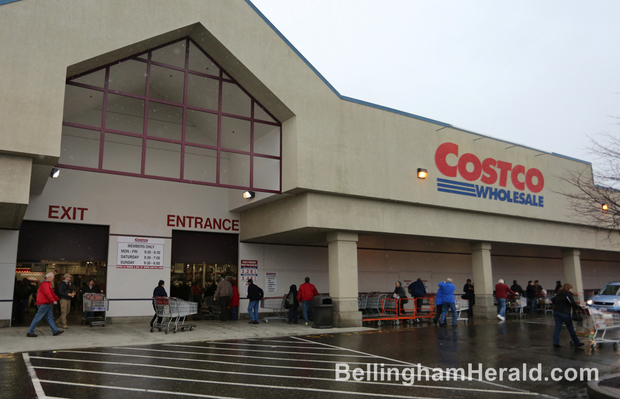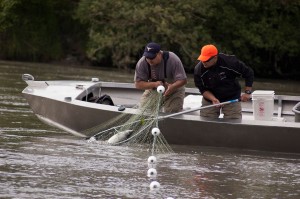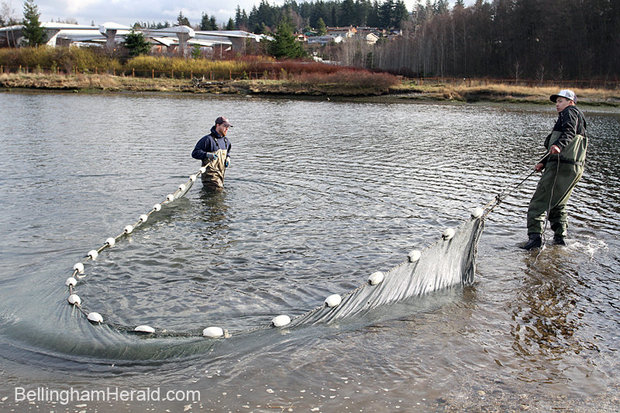
By JOHN STARK
THE BELLINGHAM HERALD May 16, 2014
BELLINGHAM – Lummi Nation and Fred Meyer Stores have appealed the city’s preliminary approval of wetlands, stormwater and street modifications along West Bakerview Road to accommodate a new Costco store.
The appeals will trigger a city hearing examiner review of the development proposal. In technical terms, the review will determine whether City Planning Director Jeff Thomas was justified in issuing a “mitigated determination of non-significance” for the work in and around the proposed Costco store. Thomas’ finding meant that the project could move ahead without a more extensive review of environmental issues, as long as steps were taken to deal with traffic and other impacts.
Brian Heinrich, Mayor Kelli Linville’s executive coordinator, said there was no way to know how long that process might delay final approval of the project. The hearing examiner will set a hearing date after checking with attorneys representing the tribe and Fred Meyer.
“Any delay can have an impact, but we trust the process and are confident that city staff have acted appropriately in application of our land use and environmental regulations,” Heinrich said in an email.
In a press release, Lummi Nation Chairman Tim Ballew said the appeal was based on concern about the project’s potential impact on salmon and the Nooksack River.
“Filling wetlands that nourish salmon-spawning streams is significant,” Ballew said. “It is significant to the health of the river, the Lummi people, and everyone who calls the Nooksack River watershed home. As the steward of the environment, it is the Lummi Nation’s responsibility to protect these waters and the fish that live in them.”
In an email, Heinrich said the city shares the Lummi concern with the environment and salmon. Because of those concerns, the city is following the law in requiring the project to add wetlands to make up for those that will be filled, while restoring a salmon-bearing stream.
Heinrich noted that Lummi Nation also has offered developers the opportunity to compensate for wetland-filling projects by buying shares in the tribe’s wetlands bank to help cover the cost of creating new wetlands to make up for those lost to development.
Lummi Nation has its own long-term plans for major retail development on tribally owned real estate farther north. In the past, tribal leaders have negotiated with the city of Ferndale on division of tax revenues from major retail development of tribally owned property inside that’s city’s boundaries. So far that issue has not been settled, and no specific development plans for the tribal real estate have emerged.
Fred Meyer’s objections to the West Bakerview project are based on traffic impacts on its existing store on the other side of West Bakerview.
“The proposed development will significantly and adversely affect (Fred Meyer’s) interests by, among other things, substantially interfering with access to the Fred Meyer store by unreasonably increasing traffic on West Bakerview Road.”
Seattle attorney Glenn Amster, representing Fred Meyer, asks the hearing examiner to order preparation of an environmental impact statement, or the imposition of other measures to reduce the traffic impacts.
The city already has decided to impose the cost of some traffic improvements on Costco as a condition of city approval, including the construction of added turning lanes for cars entering the site. The city will require Costco to provide a right-turn lane into the store parking lot for westbound traffic, plus an additional left-turn lane for eastbound traffic.
Costco has agreed to pay for those improvements, Heinrich said, but as yet there is no cost estimate.
The 20-acre Costco site is on the north side of West Bakerview Road near Pacific Highway.
Reach John Stark at 360-715-2274 or john.stark@bellinghamherald.com . Read the Politics Blog at bellinghamherald.com/politics-blog or get updates on Twitter at @bhampolitics.




